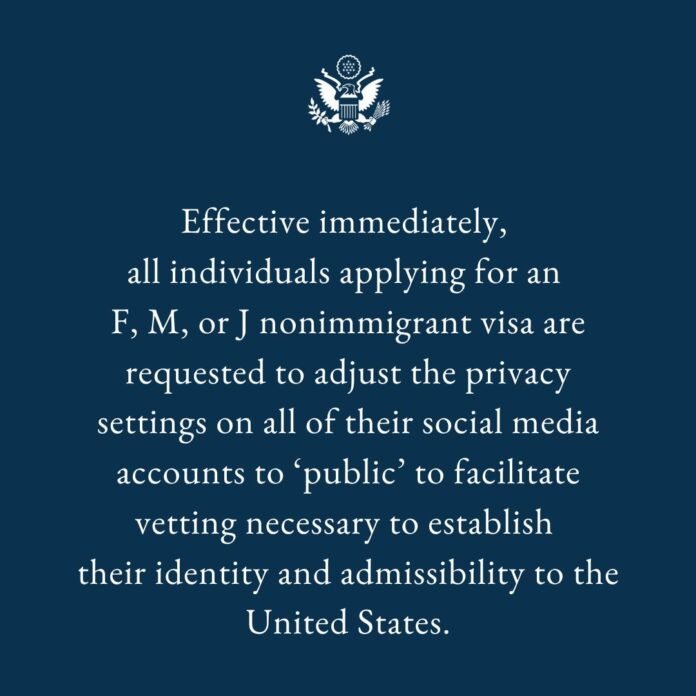A recent notice by the U.S. Embassy in Dhaka advising Bangladeshi visa applicants to make their social media accounts “public” has sparked growing alarm among students, privacy advocates, and geopolitical analysts. The directive, targeting applicants for F, M, and J nonimmigrant visas—primarily students and exchange participants—was posted on the embassy’s official Facebook page this week.
“All individuals applying for an F, M, or J nonimmigrant visa are requested to adjust the privacy settings on all of their social media accounts to ‘public’ to facilitate vetting necessary to establish their identity and admissibility to the United States.”
While the U.S. State Department has previously required applicants to disclose their social media handles, this new request for public access represents a more aggressive stance—one that digital rights groups view as a coercive extension of American digital surveillance.
From Dhaka to D.C.: A Digital Double Standard?
Legal analysts say the request is legally nonbinding, but functionally coercive. In Bangladesh—a country where online political discourse, religious sentiment, and anti-imperialist views are widespread—many now fear that this move could be used to filter visa applicants based on ideology, especially those critical of U.S. foreign policy.
Multiple students interviewed anonymously said they were advised by agents or senior students to delete or hide posts about Palestine, criticism of Israel, or even memes about U.S. foreign policy. One student said bluntly:
“They don’t say it outright, but everyone knows what we’re being warned about. If you’ve posted about Gaza or even shared certain hashtags, it’s safer to remove it.”
Such fears are not unfounded. Bangladesh has been a vocal supporter of the Palestinian cause, and social media in the country has been saturated with pro-Palestine advocacy, particularly following the recent escalations in Gaza. While U.S. officials claim their social media review focuses on “security threats,” applicants worry the real targets are political positions deemed unfavorable to U.S. strategic interests.
Palestine, Protest, and Platform Risk
The concern that online pro-Palestinian sentiment could trigger visa denials is backed by precedent. In 2019, multiple international students were detained at U.S. airports or denied entry after Customs and Border Protection (CBP) officials reviewed their social media and found posts critical of Israel or supportive of resistance movements—even if the students had not made the posts themselves, but merely followed relevant accounts.
In Bangladesh, criticism of Israeli policy is widespread among both secular and religious communities. Human rights activists point out that the chilling effect of the U.S. social media policy could stifle legitimate political expression, especially among young, educated Bangladeshis who seek to study abroad but also engage critically with global politics.
Surveillance at the Margins: A Global South Perspective
This policy, though labeled as standard security vetting, appears to be applied more rigorously in countries like Bangladesh, raising the question: Why Dhaka?
A comparative review of U.S. embassies in similarly populous countries—such as India, Pakistan, or Indonesia—found no public notice explicitly asking visa applicants to set their social media profiles to public. This inconsistency has led some observers to describe the Dhaka directive as a targeted digital profiling mechanism.
Experts warn that such profiling may disproportionately affect Muslim-majority countries, low-income applicants, and politically active students—groups already under heightened scrutiny by U.S. immigration systems since the post-9/11 era.
The Silent Danger: What Exactly Are They Looking For?
Despite multiple FOIA (Freedom of Information Act) lawsuits by civil rights organizations, the U.S. government has not released specific criteria for how social media posts are evaluated in visa decisions. There are no public standards on how humor, sarcasm, or local language context are interpreted by DHS or embassy officers.
In a leaked internal training document obtained by a U.S.-based watchdog group, consular officers were told to flag “anti-American sentiment,” “hostile political ideology,” and “incendiary language.” But those terms remain undefined.
This lack of transparency leaves applicants vulnerable to arbitrary decisions—especially when cultural context is lost or misread. For example, a meme about Western imperialism, a tweet supporting Palestinian self-determination, or even a joke referencing U.S. drone policy could be enough to trigger suspicion.
Conclusion: Between Opportunity and Digital Censorship
Bangladeshi students are among the fastest-growing demographics in U.S. higher education, with thousands accepted each year into American universities. But with this latest shift, many now feel forced to sanitize their digital presence in order to gain access to academic opportunities.
This is not merely a privacy issue. It is a question of ideological gatekeeping. At a time when Bangladesh’s youth are more connected, more globally aware, and more politically conscious than ever, this policy risks sending a message that intellectual dissent, political expression, or simply solidarity with global causes might be disqualifying.
In the end, the world’s most powerful democracy is quietly telling its applicants: freedom of expression may be your right—just not if you want a U.S. visa.


